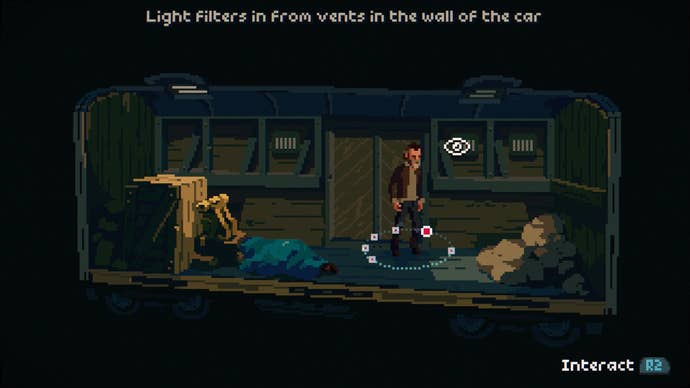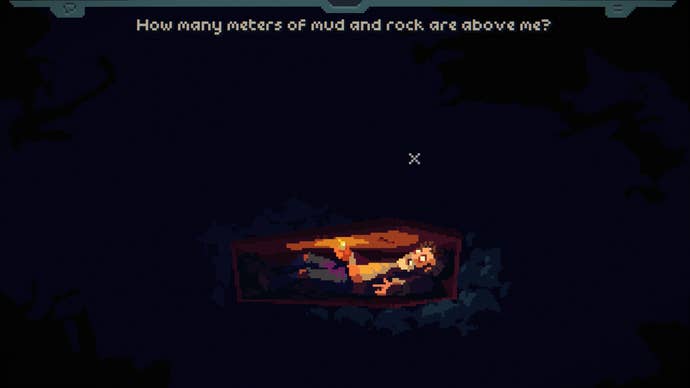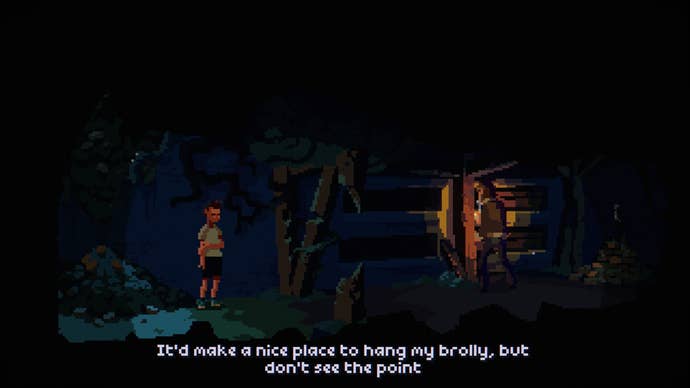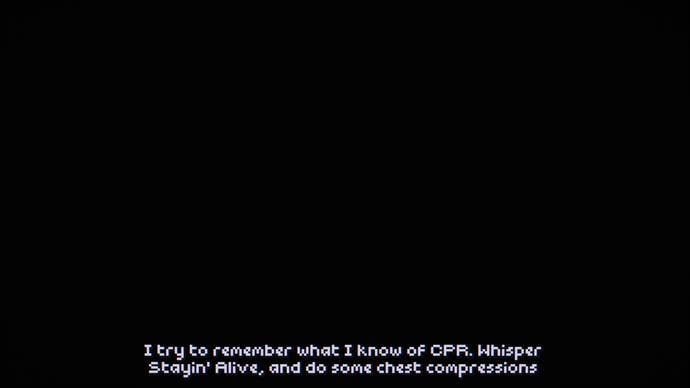The Drifter is sometimes quite silly in ways I don’t think are intentional, and it managed to yank me right out of the experience more than once. You obviously have to be in a thing to get yanked out of it though, which is my way of saying that The Drifter is good, although I will be taking the piss out of it later. It’s stylish, moody, and pulls off the point n’ click adventure game two-for-one: characters worth caring about, and also characters worth irritating by fiddling with their stuff.
Mostly though, it’s just got a great eye for an arresting scene or setpiece. Some of my favourite parts did end up being its more complex multi-scene puzzles, but mainly because these are used sparingly in a story with bloody-minded dedication to anxious forward momentum.
Watch on YouTube
The game opens with roughspun, irritable but dogged protag Mick Carter hitching a train cart to a home he told himself he’d never return to. There’s a funeral in a few days, and he’s vowed to his sister he’ll be there. Mick initially seems pulled straight out the vaguely noirish haunted alcoholic playbook, but it doesn’t take long to realise he’s a fair bit more interesting than that. It’s not empty bottles, but a trail of broken promises and obligations that Mick’s left in his wake.
When the train stops, Mick’s raving paranoid cartmate is gunned down by mystery bastards, and Mick barely escapes by jumping off the train into a rubbish pile on the street below. Between the mystery bastards, rumours of a spate of missing homeless folk, and the bizarre visions Mick is soon assailed by, things get conspiratorial and dangerous quickly. But Mick’s actual goals remain the same: he just wants to get to his sister’s place, to be with his family. It’s this human touch that anchors The Drifter throughout, no matter how B-movie batshit tinfoil it gets. Although for the record, I do love some B-movie batshit tinfoil, and The Drifter absolutely delivers here.
I initially wanted to use a controller. Partly because The Drifter seems proud of its controller scheme, but mostly because leaning back in a chair during work hours makes me feel powerful. It’s a thoughtful scheme, too. Interactables are marked as spots in a ring, so you just need to twirl around the thumbstick to visit anything interesting. I’m sure it’ll be very useful to a lot of people.

Personally, though, I found the hotspot wheel takes away too much of the good stuff. It encourages interacting with the wheel itself rather than the environment; looking without seeing. I’d prefer to hold on to a little mystery, otherwise it’s like going dungeon delving with a SatNav. The game uses lighting in some thoughtful ways to draw you toward discoveries, and you can always hold the H key to highlight hotspots (huzzah). Also, while we’re on the UI, The Drifter has some excellent fonts. Just, very good lettering.
Not that Mick himself would appreciate those fonts. He tends to get exasperated any time he’s forced to interact with a computer – crusty, tiresome old bastard with a heart of gold that he is. He’s both the best thing about The Drifter and was, for a decent chunk, the biggest barrier I faced in taking the game seriously.
Mick’s dialogue is well written. Evocative while (mostly) avoiding sounding too writerly. It’s also occasionally very funny. Mick’s actor, Adrian Vaughan, has a powerful voice and it’s often very magnetic. The problem is that the game is frontloaded with a lot of very intense, often life-threatening situations for Mick, and Vaughan is giving it 400% all the time. It works well at first, but there comes a point where Mick is being thrown from one nightmare to another, internally freaking out constantly. It slips into absurdity pretty easily and still Mick carries on, narrating his every action at maximal volume and with maximum arse.

It’s a little hard to explain, but it made me conjure an image of being a nice, chill family picnic on a beautiful day, then suddenly being accosted by a large, haggard Australian man, who picks up a sandwich and very slowly leans into my ear and starts shouting “WITH CAT-LIKE REFLEXES I REACH OUT AND GRAB THE SANDWICH. THE PREVIOUS OWNERS ARE NONE THE WISER”. And it’s like, “I can see you mate”. “I’M SUDDENLY OVERCOME WITH A COLD FEELING OF PURE DREAD, LIKE MY LUNGS ARE FILLING WITH ICE. THE SANGA HAS TUNA IN IT. FUCK.”
And it’s not like this same level of intensity doesn’t work well elsewhere. Like, this sort of full-chestedness is what you want from an actor really. Mick’s monologues can be frightening and harrowing and gripping, they’re just packed in too tightly in the first half of the game. This is also where Mick spends the most time alone, and he’s at his best when he’s got other characters to bounce off, for comedy or drama or touching moments. His ex-wife Sarah is the emotional core of the story. A tropey, slick New Yoik detective both fits in well and reminds you that the game knows it isn’t above some 90’s Lucasarts silliness. Mick’s initially tiring intensity feels like a side effect of the early game’s dedication to breathless pacing, which might well be a fair trade on balance. But since it smooths out nicely around the midgame, I do wish these early chapters – or just Mick’s actor – had pumped the brakes a little.
The Drifter’s approach to puzzle design is best summed up in how it often completely empties your inventory between chapters. The upshot is that this keeps the majority of the puzzles very much in scene. The inventory doesn’t get bloated, and you don’t get any moments where the solution to a problem is a piece of junk Mick thoughtlessly pocketed right at the beginning of the game. The downside is that I actually really like when adventure games do that.

I’d actually call some of The Drifter’s puzzles straightforward to the point of being automatic, but even this feels deliberate: simple tasks employed as pacing tools to punctuate the drama. Someone needs their head stitched. You find dental floss. Then a fishing hook tangled in pile of lines. Then scissors to cut it out. Then combine it with the floss. Then sterilise it with steam from a coffee machine. This all takes place across three adjacent areas. It’s instantly clear what everything’s for. and these are the only objects available to you anyway. But this also occurs at a point in the story where stalling would be painful, so it works well.
There are a few more complex, chapter-wide puzzles too, and the game ends up hitting a good balance. Elsewhere, some triggers for things like characters moving from place to place can feel somewhat arbitrary, relying on revisiting areas once you’ve already exhausted other options. It feels like you’re occasionally forced to get stuck, basically, if only for a few minutes.
The soundtrack is a real scene-setter; thick, dark, and synthy. Sometimes it’s clattering, hellish soundscapes – genuinely gutwrenching. Sometimes its gothy disco. Some of it is more understated, reminding me of Tycho’s early work. There’s a victory lap scene towards the end, scored so triumphantly I was waiting for Mick to let out a powerful “It’s Driftin’ Time”. Great stuff.

Between the emotional core centering around Mick and his family, the B-movie batshit tinfoil sci-fi stuff, and the eventual revelations that tie everything together in both theme and plot, there are a lot of elements jostling for space and time in The Drifter. It’s impressive that it manages to wrap things coherently, nevermind the satisfying and touching way it does. Ultimately, it’s a good story, well told, that knows when to lay on the head scratchers and when to ferry you along with simple tasks. I just hope Mick’s actor remembered to combine honey and lemon with tea after recording.






_VqYPkAw.jpg?width=1200&height=630&fit=crop&enable=upscale&auto=webp&w=100&resize=100,100&ssl=1)